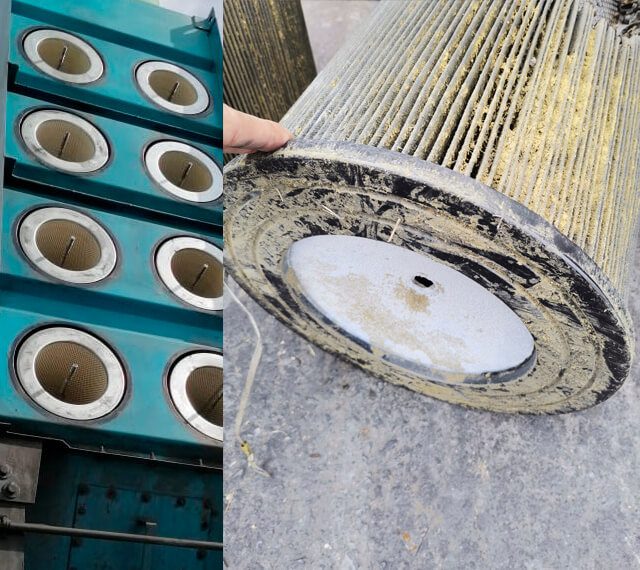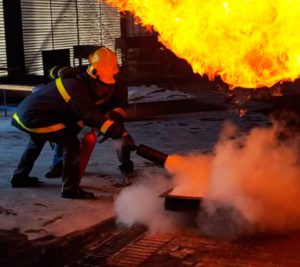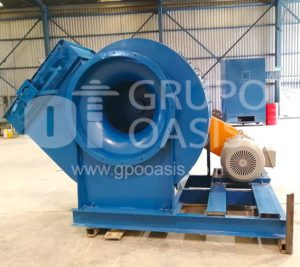Colectores Industriales Polvo
Limpieza en filtros para colector de polvos
Colectores Industriales Polvo
Limpieza en filtros para colector de polvos
Limpieza en filtros para colector de polvos

BLOG
Why is filter cleaning important?
Some of the most common problems when cleaning filters with pulse jet systems are due to the poor quality of the compressed air, which is sometimes dirty, humid or with oil, which causes difficulties in correctly removing adhering residues to these.
At present, dust collectors bag type or cartridge type, implement automated cleaning systems, better known as pulse jet, which consists of expelling compressed air through a system of valves, these allow the exit of pressurized air to shake the filters and avoid their saturation, therefore we must make sure that the compressed air that will be used for this task is clean and dry, this will help prevent filtering problems, unnecessary stops of the collector, constant filter changes, delays in operation and possible damage to other components of the equipment.
What is compressed air?
“Air whose volume has been decreased by compression to be used when expanding“.
In industrial collectors, it is used for cleaning the filter box, thus avoiding their saturation.
Cleaning
The contaminants that accumulate on the surface of the filters, cause the differential pressure in the chamber to increase, this means that when the pressure reaches the established limit, a pressure switch activates the sequencer, this in turn sends a signal to the solenoid valve so that it opens and releases the pressure that is holding the diaphragm valve.
The opening of the diaphragm valve allows the clean and dry compressed air to be expelled in the form of a jet, this penetrates the filter and creates a downward and radial air stream towards the rest of the cartridges, with this it is possible to remove the accumulated dust on them.
Humidity Hazard
Due to the humidity loaded in the environment, it can penetrate into the compressor. During compression, 7.8 ft³ atmospheric air, is reduced to 1 ft³ compressed air at 100 psig. The air concentration increases the humidity, in this case by a factor of 7.8: 1, which will saturate the air if the relative humidity is greater than 12.8%.
As compression increases the air temperature, this level of humidity is not a problem at first, but as the compressed air circulates into the dust collector, the air cools and condenses, this causes it to mix with dust and creates a muddy film that affects the performance of the filters and decreases the filtering capacity.
Oil Hazard
Another important factor to take into consideration is that the compressed air is contaminated with oil, which will cause some difficulties; the combination of compressed air with oil and dust can form a thick layer of dust on the top of the filter; also these can break and cause their detachment from the base.
Risk of clogging due to dirt
In addition to the aforementioned factors, it is very important to take into account, the dust particles in the compressed air, these can get lodged in the outlet holes of the Solenoid valves or diaphragm, so this would prevent the valves from closing quickly and allow the passage of additional air not contemplated, and therefore causes the filters to be over cleaned and damaged.
How to prevent compressed air from damaging the filters?
There are some accessories that can prevent compressed air contaminated with dirt, moisture or oil from reaching the filters, such as traps, air filters, oil filters and dryers.
Detecting any of these and other problems in your industrial dust collector in time will prevent more advanced damage in the short term, if your company has this or other problems with its equipment, contact us to analyze the situation and find out what would be the best solution.
At Grupo Oasis we have a wide variety of filters for any collector type, in addition to all the spare parts you need for the proper functioning of your equipment.
Limpieza en filtros para colector de polvos
Limpieza en filtros para colector de polvos. La versatilidad de nuestros Dust Collectors, Smokes and Mists DYNAFLO®. brand, the attention to detail during the manufacturing and installation process allowed us to todo México y parte de Estados Unidos. Nuestros clientes de las industrias agroalimentaria, cementera, química, cerámica, automotriz, acerera, entre otras más nos respaldan. Los sistemas industriales DYNA FLO®, permiten controlar, capturar y filtrar partículas suspendidas en el aire de hasta 0.5 micras, evita emisiones contaminantes a la atmósfera y mejora la calidad del aire en tus instalaciones. Diseñamos soluciones eficientes
Limpieza en filtros para colector de polvos
Colectores Industriales Polvo / Colectores de Humos / Colectores Industriales Polvo / Colectores de Humos / Colectores Industriales Polvo / Colectores de Humos Colectores Industriales Polvo / Colectores de Humos Colectores Industriales Polvo / Colectores de Humos
Other articles of interest

Fire risk
One of the main concerns of insurance companies and business owners is the latent threat of fires within the facilities due to dust accumulation, which are a possibility.

How to improve the air flow of your Centrifugal Fan?
Los diversos procesos de producción industrial y los Sistemas de Ventilación en las Plantas, en algunas ocasiones requieren incrementar el flujo de aire para el que originalmente fueron calculados los equipos, por ejemplo…

Common mistakes when investing in a Dust Collector
As head of the maintenance, purchasing or manager area, one of the main responsibilities when requesting the purchase of equipment to solve a problem in the company is to have all the necessary information to be able to evaluate and make the best decisions.






